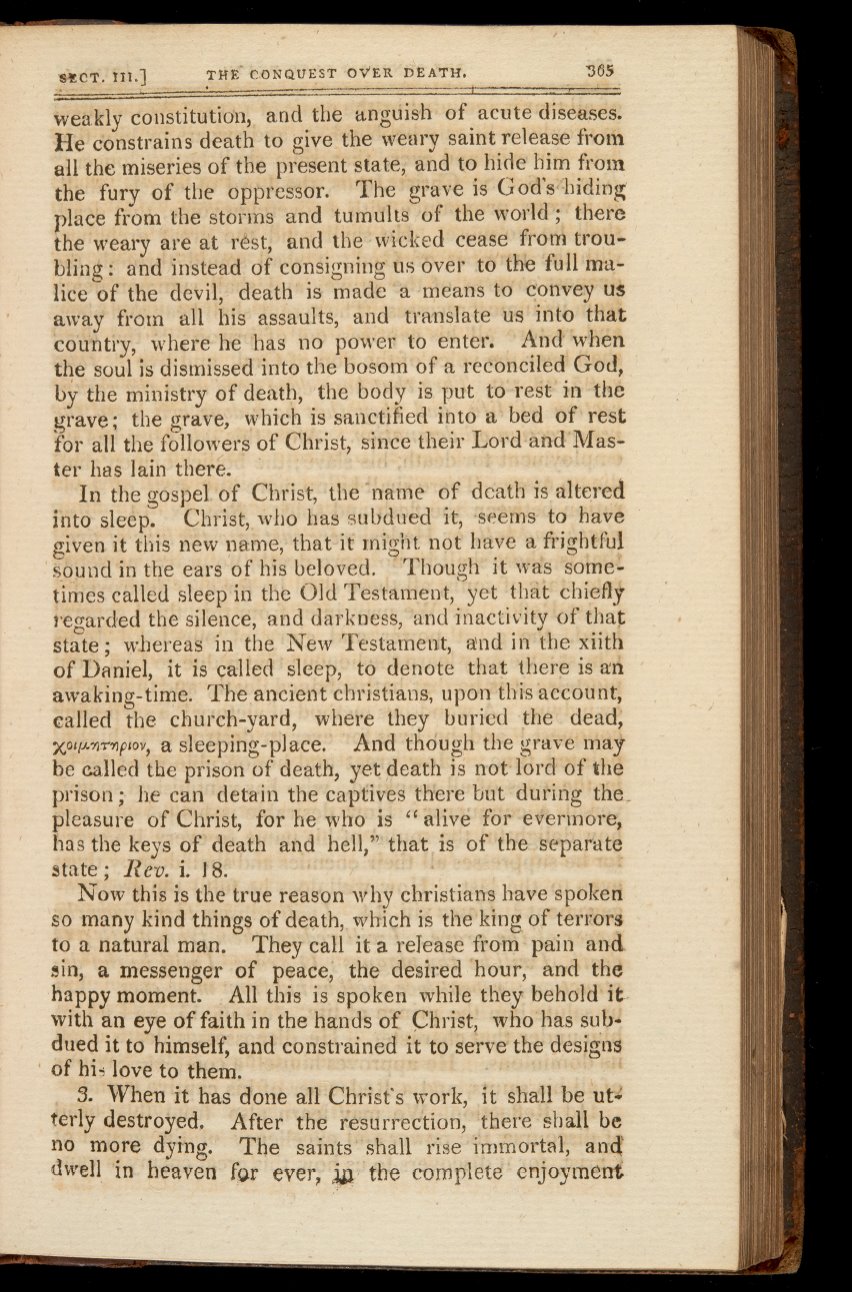

SECT.
III.]
THE
CONQUEST OVER
DEATH.
365
weakly constitution,
and
the anguish
of
acute
diseases.
He
constrains
death
to give
the
weary
saint release
from
all the miseries
of
the present state,
and
to hide
him
from
the fury
of
the oppressor.
The
grave
is
God's hiding
place from the storms and
tumults of
the
world
;
there
the
weary
are
at
rest, and the wicked cease from
trou-
bling
:
and
instead of
consigning
us
over
to
the
full
ma-
lice
of
the
devil,
death
is
made a means to convey us
away from all
his
assaults,
and
translate
us
into
that
country,
where
he has
no power to
enter. And when
the
soul
is
dismissed
into the bosom
of
a reconciled God,
by
the ministry
of
death, the
body
is
put
to
rest
in
the
grave;
the grave,
which
is
sanctified into
a bed
of
rest
for
all
the followers
of
Christ, since
their Lord
and
Mas-
ter
has lain
there.
In
the
gospel
of
Christ, the
'name of
death
is
altered
into
sleep.
Christ,
who
has
subdued
it, seems to
have
given
it
this new name,
that
it might
not
have
a
frightful
sound
in
the ears
of
his
beloved.
Though
it
was
some-
times called sleep
in
the Old
Testament,
yet
that
chiefly
regarded
the
silence,
and darkness,
and
inactivity
of that
state
;
whereas
in
the New
Testament, and
in
the xiith
of
Daniel, it
is
called
sleep,
to
denote
that
there
is
an
awaking
-time.
The ancient
christians, upon this
account,
called the church -yard, where they buried the dead,
xoi¡.cmz'mpiov,
a sleeping place.
And though
the
grave may
be
Galled
the prison
of
death, yet
death
is
not
lord
of
the
prison
;
he
can
detain
the captives
there but during
the
pleasure
of
Christ, for he
who
is
"
alive
for evermore,
has the
keys
of
death and
hell,"
that
is
of
the
separate
state
;
Rev.
i.
18.
Now
this
is
the
true reason
why
christians
have spoken
so
many kind
things
of
death, which
is
the
king
of terrors
to a
natural
man. They
call
it
a
release from pain
and
sin,
a messenger
of
peace,
the desired hour, and
the
happy moment.
All
this
is
spoken
while
they behold
it
with
an
eye
of
faith
in
the
hands of Christ,
who has sub-
dued
it
to himself,
and constrained it
to serve the designs
of
hi- love
to them.
3.
'When
it
has done all
Christ's
work,
it
shall be
ut=
terly destroyed.
After the resurrection, there
shall be
no
more
dying.
The
saints shall rise immortal,
and
dwell in
heaven
fur ever,
in
the complete
enjoyment

















